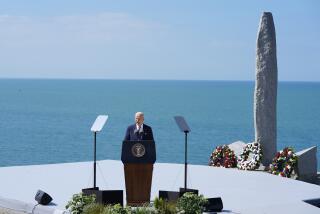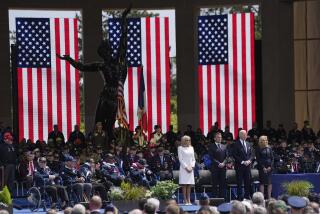A Debt of Gratitude to an Extraordinary Generation of Heroes
They saved Private Ryan--and they also saved us.
I am referring to that amazing generation of people who fought World War II. They paid a huge price for the generations that followed.
Thank God, they won that war. Just consider how different our lives would be if they had lost.
Times weren’t real good when World War II began. We were just coming out of the Great Depression. Having been born in 1932, I was too young to understand those things. I don’t remember lacking any of the basic necessities because my dad was a police officer and had a steady job.
When I was a kid, Ventura was a small town of fewer than 20,000 people. The old downtown had all we needed. It was like one big shopping mall of today. It had restaurants, theaters, pool halls, malt shops grocery stores, clothing stores, bars, dance halls and--as an extra, added attraction--a city park and beach with a pier. Everybody knew everybody. It was a great place to grow up.
The young men of that period had visions of getting a decent job, getting married, raising a family and enjoying a simple life. However, just like today, in different parts of the world things were going on that weren’t good. The United States tried to stay isolated from that; we had our own problems to solve.
Dec. 7, 1941, changed the whole picture. Pearl Harbor was attacked and now we were involved.
The transition that took place was something to experience. Over the next four years, everybody and everything was geared for the war effort. Gas was rationed, as was food and other critical items. Nobody complained; the atmosphere was “all for one and one for all.”
Servicemen were everywhere in town. If you were a kid like me, they were your heroes.
The only sources of information were the newspapers and the newsreels at the movie theater. Everybody wanted to know what was going on and where. The early victories of Doolittle’s raid on Tokyo, the Battle of Midway and the invasion of Guadalcanal created as much excitement as your favorite team winning the Super Bowl.
Over the next two years, we read about the war in the Pacific progressing island by island, battle by battle. We knew that in order to achieve total victory we still had to deal with Europe.
When the D-Day invasion of Normandy hit the papers, we just knew this was the beginning of the end. Finally in 1945 came VE Day--Victory in Europe--followed by VJ Day--Victory in Japan--after atomic bombs were dropped on Hiroshima and Nagasaki.
On each victory day, downtown Ventura went wild with celebration. From Chestnut Street down Main Street to Ventura Avenue, plus all the side streets, it was wall-to-wall people celebrating like mad. They were kissing, screaming, yelling, drinking and dancing in the streets. These days, people do that just for winning an international soccer match.
Soon the veterans were returning and trying to pick up where they had left off. Economists were highly nervous, wondering where 12 million men were going to find jobs. They predicted disaster but it didn’t happen. The same generation that combined talents to win a huge war now used those same talents to create the greatest peacetime economic boom this country has ever seen.
There was a price for all this, paid by the hundreds of thousands who never made it back from the battlefields. Add to that the multitudes who returned without all of the physical attributes they were born with. What about them?
My admiration for this generation began to build. They fought hard so people like me would have a future. I had to learn what made them tick.
I read every book about every battle as they were printed over the years. Sought out accounts by authors who were there when it happened. Watched documentaries like “Victory at Sea.”
Over the years, I’ve asked many individuals to tell me their personal experiences, and they were amazing. I’ve talked to bomber pilots, fighter pilots, submarine crewman, PT boat crewmen, bazooka men, the list goes on. Some fought on Guadalcanal or Midway, survived the Bataan Death March or were prisoners of war in Japan or Germany. Their stories were much different than Hollywood movies portrayed.
In June 1950, the month I graduated from high school, the Korean War broke out. By July, I had joined the Air Force and by October was sent to England with the Strategic Air Command. I got into Germany and was able to view the remnants of the war that had ended in both countries just five years earlier.
In 1994, 42 years later, I returned to both countries to retrace my experiences and tour the invasion beaches of Normandy.
I visited the Omaha Beach cemetery and eventually made my way down to the beach and walked around by myself for an hour or so. On this very calm beach it was hard to picture what had happened there 50 years earlier.
Time is moving on and soon the generation that won World War II will no longer be around to thank. So I thank them now, and I hope others in the generations that followed will do the same.
*
‘The Americans whose names appear here were part of the price that free men for the second time in this century have been forced to pay to defend human liberty and rights.
‘All who shall hereafter live in freedom will be here reminded that to these men and their comrades we owe a debt to be paid with grateful remembrance of their sacrifice and with the high resolve that the course for which they died shall live eternally.’
--Inscription on memorial to missing-in-action soldiers and airmen at American cemetery near Cambridge, England
More to Read
Only good movies
Get the Indie Focus newsletter, Mark Olsen's weekly guide to the world of cinema.
You may occasionally receive promotional content from the Los Angeles Times.









